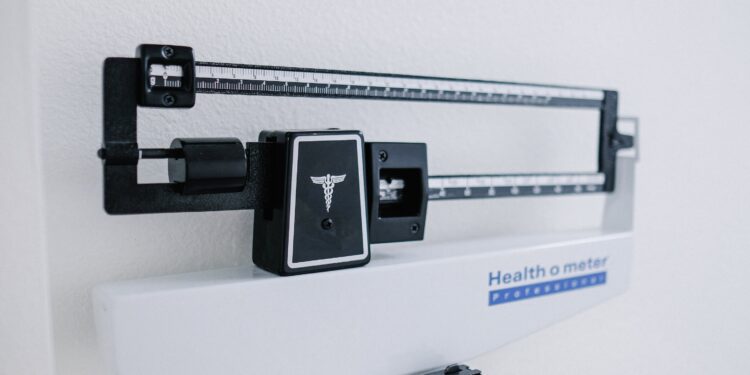Credit: Unsplash/CC0 Public domain
Expanding access to new, highly effective weight-loss drugs could prevent more than 40,000 deaths a year in the United States, according to a new study led by researchers at the Yale School of Public Health and University from Florida.
The work is published in the journal Proceedings of the National Academy of Sciences.
The findings underscore the critical need to address existing barriers that prevent people from accessing effective weight loss treatments and hinder public health efforts to address the national obesity crisis, the researchers said. According to the U.S. Centers for Disease Control and Prevention, about 74% of Americans are considered overweight, and about 43% of them are considered obese.
The widespread impact of obesity on health is well documented. This exacerbates diseases such as type 2 diabetes, cardiovascular disease and certain cancers. Yet, despite its serious consequences, the development and deployment of highly effective treatments for obesity is lacking.
However, recent advances in pharmaceutical interventions, particularly the introduction of glucagon-like peptide-1 (GLP-1) receptor agonists, such as Ozempic and Wegovy, and dual gastric inhibitory polypeptide receptor agonists and GLP-1 (GIP/GLP-1), such as tirzepatide, have demonstrated substantial effectiveness in weight loss. These medications have shown promise in clinical trials and are increasingly used for weight management.
In conducting their study, the researchers sought to quantify the potential impact on mortality of increased access to these weight-loss drugs. They integrated data on the mortality risk associated with different body mass index (BMI) categories, the prevalence of obesity and current limitations in access to medicines due to high costs and drug restrictions. insurance.
According to the findings, if access to these new drugs were expanded to include all eligible people, the United States could experience as many as 42,027 fewer deaths per year. This estimate includes approximately 11,769 deaths among people with type 2 diabetes, a group particularly vulnerable to complications of obesity. Even under current conditions of limited access, researchers project that about 8,592 lives are saved each year, primarily among those with private insurance.
The study highlights a critical disparity in access to medications. Currently, the high cost of these medications, which can exceed $1,000 per month without insurance, limits their availability. For example, Medicare – one of the largest insurance programs for seniors – does not cover these weight loss medications, impacting many people who could benefit from them. Medicaid coverage varies widely by state, and private insurance often imposes high deductibles and copayments, further restricting access, the researchers said.
“Expanding access to these medications is not only a matter of improving treatment options, but also a crucial public health intervention,” said Dr. Alison P. Galvani, Ph.D., a from the study’s corresponding authors and Professor Burnett and Stender Families. in Epidemiology (Microbial Diseases) at the Yale School of Public Health. “Our results highlight the potential to significantly reduce mortality by addressing financial and coverage barriers.”
The study also explored how expanded access could affect different regions and socioeconomic groups. States with high rates of obesity and diabetes, such as West Virginia, Mississippi and Oklahoma, stand to benefit the most from increased drug availability. In these areas, expanding access could lead to the greatest reductions in per capita mortality.
However, the study authors caution that while the potential benefits are substantial, several challenges remain. The high price of these drugs poses a significant obstacle and concerns remain about the profit margins of the pharmaceutical industry. Additionally, supply constraints and production limitations continue to hamper widespread availability.
“Addressing these challenges requires a multifaceted approach,” said Dr. Burton H. Singer, Ph.D., another corresponding author of the study and assistant professor of mathematics at the University of Florida’s Emerging Pathogens Institute. “We must ensure that drug prices are better aligned with manufacturing costs and increase production capacity to meet demand. At the same time, we must address the insurance and affordability issues that prevent many people from getting the treatment they need.
Researchers also examined the impact of socioeconomic factors on the effectiveness of expanded access to medicines. They adjusted their estimates to account for income disparities, finding that even with these adjustments, the potential for lives saved remains significant. The findings suggest that improving access to these medications could reduce health care costs associated with obesity-related conditions and improve the overall quality of life for many Americans.
More information:
Abhishek Pandey et al, Estimating the number of lives that could be saved through expanded access to weight-loss drugs, Proceedings of the National Academy of Sciences (2024). DOI: 10.1073/pnas.2412872121
Provided by Yale University
Quote: Expanding access to weight-loss drugs could save thousands of lives a year, researchers say (October 18, 2024) retrieved October 18, 2024 from
This document is subject to copyright. Apart from fair use for private study or research purposes, no part may be reproduced without written permission. The content is provided for informational purposes only.



